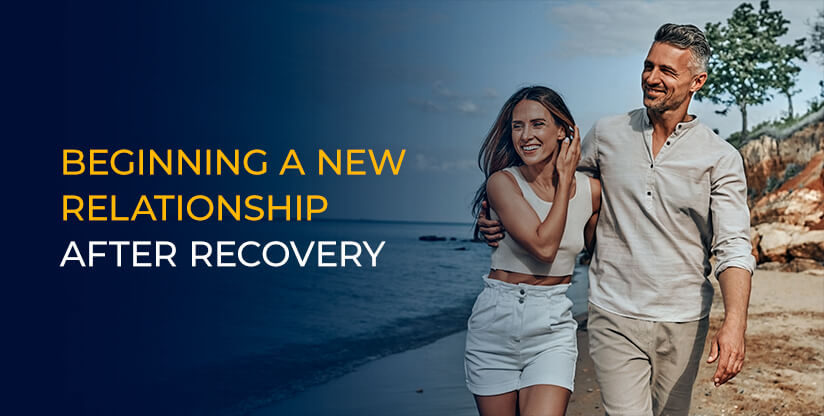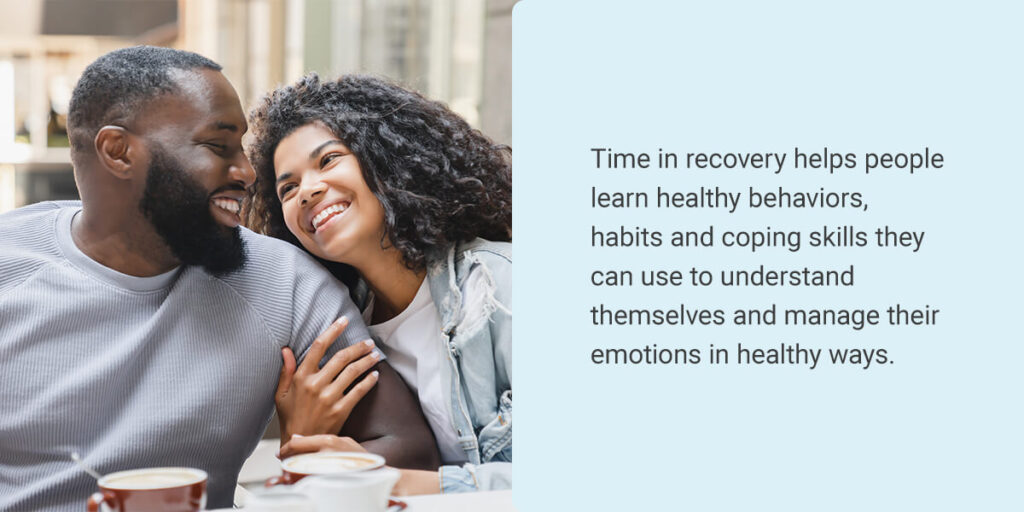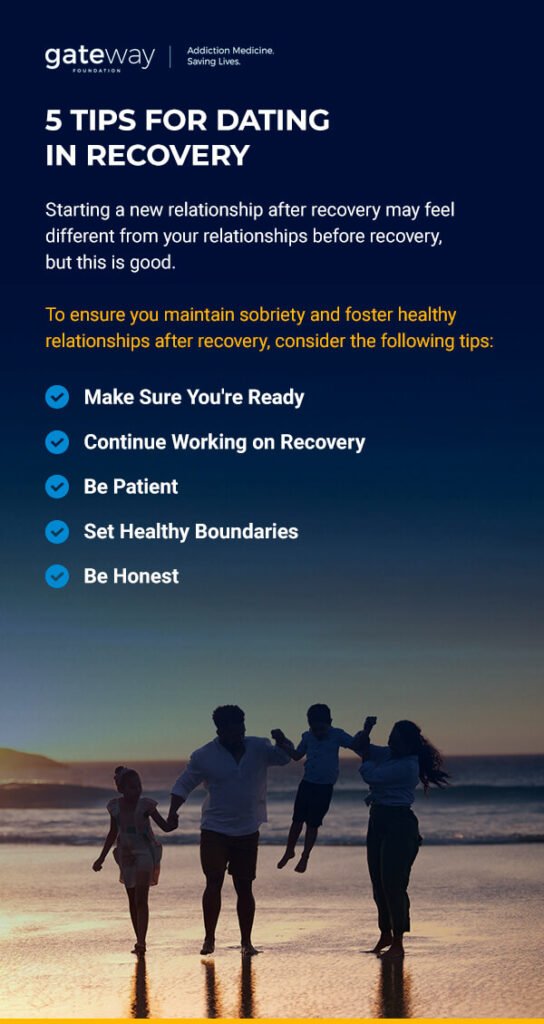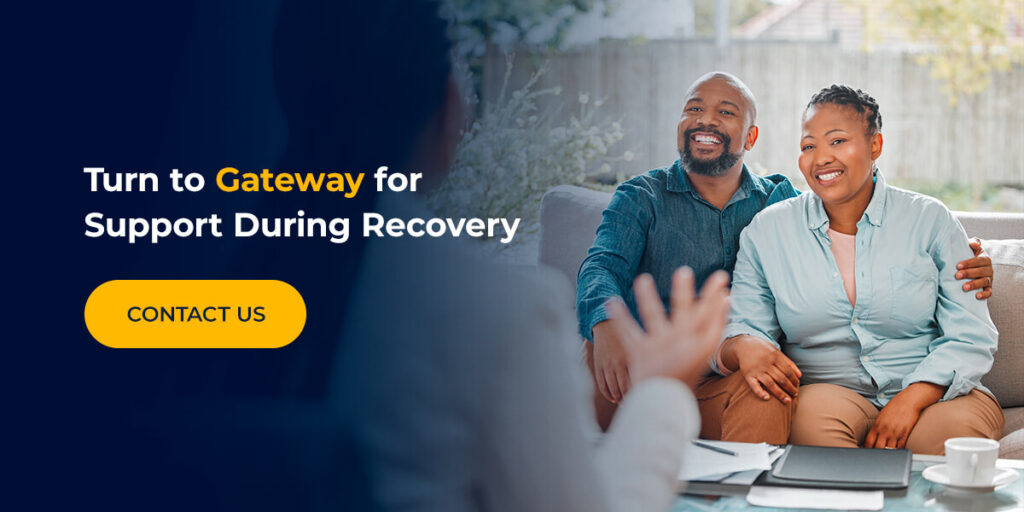- Oct 8
- AddictionDrug Addiction Treatment

Starting a new relationship can be exhilarating, but it’s important to be mindful and discerning if you or someone you know is considering dating in recovery.
The emotional highs of a romantic relationship can mimic how your brain feels on drugs or alcohol. If you’re in early recovery from addiction, give yourself time. When challenges arise in a personal relationship, it’s essential to handle them without relapsing into old habits. Your first year of recovery should focus on your health and well-being.
Why You Should Wait Until After Your First Year of Recovery
A relationship can be a healthy and rewarding part of someone’s life. However, relationships require work and mindfulness, especially when one or both partners are in recovery. Romantic relationships are one of the most common causes of relapse in early recovery, so professionals recommend individuals wait until they have achieved at least one year of sobriety before starting a new relationship.
It’s important to focus on getting to know yourself and define your personal morals and values during your first year of recovery because you must love and respect yourself before you can healthily love another person. Waiting at least one year to start dating while in recovery presents the following benefits:

Dating With a Healthier Mindset
Early in recovery, people may hide or bury their emotions to protect themselves from being hurt or become infatuated with another person and romanticize a relationship without healthy discernment. Time in recovery helps people learn healthy behaviors, habits, and coping skills they can use to understand themselves and manage their emotions in healthy ways.
Developing important emotional skills is crucial to avoiding drugs and alcohol, but these skills are also incredibly helpful in maintaining healthy relationships. An individual who has been in recovery for a year or more can use these learned skills to approach new relationships with objective thinking and healthy communication.
Choosing Healthier Partners
A person who has been in recovery for at least a year has most likely learned to identify unhealthy patterns and replace them with healthier ones. This means they are less likely to repeat unhealthy dating patterns they may have followed before recovery and choose healthier partners. When you reach a healthy emotional maturity level, you are more likely to choose partners who are also at a healthy emotional maturity level.
If you date too early in recovery, you may choose partners similar to unhealthy partners you dated in the past. Dating later in recovery gives you time to build self-esteem and confidence to choose partners who will support your recovery and treat you with respect.

Time to Address Underlying Addiction Causes
Dating too soon in recovery can cause many people to replace one addiction with another. Feelings of infatuation and lust are strong, and they can become unhealthy coping mechanisms. An individual may seek comfort in another person to replace the high they used to seek in drugs or alcohol, forming an unhealthy attachment to a relationship.
Recovery gives you time to address the underlying challenges, emotions, triggers, compulsions, and mental health conditions that made you turn to substance use in the past. It’s important to address these before entering a relationship so you don’t use the relationship as a coping mechanism.
If you’re recovering from addiction, it may take several months to re-learn healthy habits and coping skills. Recovery is a process that takes time. During your first year of recovery, focus on your mental, physical and emotional health. Then, reevaluate how you feel and take steps toward forging a healthy personal relationship.
Seven Red Flags to Look for in Romantic Relationships
When starting a new romantic relationship, it’s easy to get caught in a whirlwind of emotions. But it’s essential to look for any potential red flags in your partner’s behavior. Identifying these seven red flags can save you from heartbreak and help support your long-term recovery:
- Lack of communication and trust
- Lying
- Infidelity
- Controlling behavior
- Existing drama from prior relationships
- Lack of intimacy
- Inability to solve conflicts
If your partner has a habit of dismissing your concerns or opinions or ignoring you altogether, take a second look at the relationship. Notice if you start giving up activities, hobbies, or old friends to satisfy your partner. These are signs of an unhealthy relationship that should not be ignored.

5 Tips for Dating in Recovery
Starting a new relationship after recovery may feel different from your relationships before recovery, but this is good. Recovery is meant to impact your life and relationships positively, including your dating relationships. To ensure you maintain sobriety and foster healthy relationships after recovery, consider the following tips:
1. Make Sure You’re Ready
While recovery professionals recommend waiting at least one year before dating, you may need more time to work on yourself before pursuing a new relationship. Before starting a romantic relationship, make sure you are ready to form an emotional connection with another person.
Evaluate your progress and determine if you have taken enough time to work on your emotional triggers and learn healthy ways to cope with stress before entering a new relationship. Make sure you are healthy and comfortable enough in your sobriety to handle the challenges dating can introduce.
2. Continue Working on Recovery
Working on your recovery program is crucial during the first year, but it is still important in the years that follow. Your 12-step program, therapy sessions, and support from your sponsor will help you follow your relapse prevention plan as you move farther along in your recovery journey. A new relationship may make you feel incredible and start to believe you can stay sober without your support system, but you will still need ongoing support to stay on track. Remain focused on your recovery so your relationship doesn’t become a distraction or reverse your progress.
3. Be Patient
It’s easy to get caught up in emotions and rush into a new relationship when it’s exciting and fun, but it’s important to take things slow. Entering a relationship slowly lets you practice mindfulness and discernment. You can get to know another person while remaining emotionally balanced by pacing the relationship and remaining objective.
4. Set Healthy Boundaries
Advocating for yourself, your healing, and your recovery process are important in a new relationship. Prioritizing your personal growth prevents you from measuring your worth in another person or using a relationship to cope with challenges. Healthy boundaries protect your mental health and help you maintain a healthy relationship.
It’s especially important to set boundaries around substance use. Your partner should respect your choice to abstain from drugs and alcohol, and they should understand if you decline invitations to go to bars or parties that may increase your cravings. They should also respect your recovery process and any time you need to take to focus on your physical, mental, and emotional health.
5. Be Honest
Honest communication is crucial to any relationship, but it is especially essential for individuals in recovery. Be open and honest about your recovery process. Honesty is one of the most important factors in the recovery process, and being honest with dating partners can help you stay sober. Being honest in a romantic relationship also helps your partner understand your boundaries so you can avoid triggering places and activities.
It’s also important, to be honest with your friends, family, support group, therapist, and sponsor about a new relationship. Being honest about dating a new person and how you feel about it can help you recognize any potential unhealthy patterns or emotional pitfalls.
Turn to Gateway for Support During Recovery
Recovering from drug or alcohol use can significantly impact your life. In recovery, you can learn healthy ways to cope with stress, regulate your emotions, deal with triggers, build self-esteem, address mental health conditions and foster healthier relationships. Approaching relationships with a healthy mindset can help you maintain your sobriety and choose romantic partners who respect your recovery.
If you or a loved one needs help with recovery, Gateway Foundation can help. At Gateway Foundation, we offer effective, safe, and personalized recovery support options such as individual and group therapy, support groups, experiential therapy, art therapy, movement therapy, psychological testing, psychiatric care, medical care, and specialized therapeutic techniques. Gateway Foundation can help you regain your life, maintain sobriety and develop a healthy mindset. Contact Gateway Foundation for recovery assistance, and learn how we can support your recovery journey.



